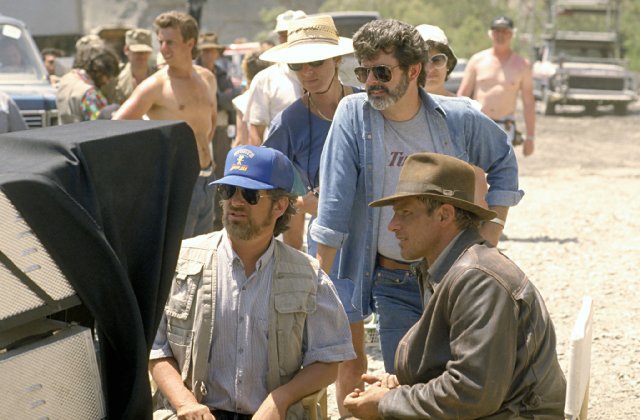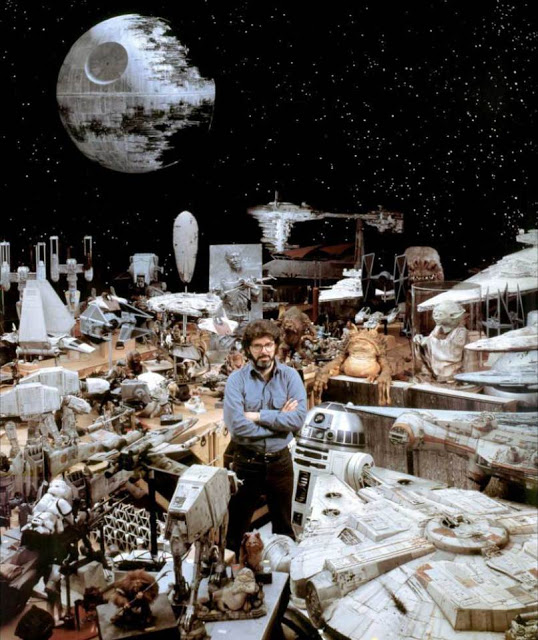With Episode VII coming out, I’m going to have to shill for George Lucas.
As the years go by, people dump on him more and more for his many missteps (and he does deserves a lot of the criticism). But we’ve gotten to the point that people even call into question what, if any credit he deserves for the success of the first Star Wars film, arguing that his then-wife Marcia Lucas and the rest of the creative team were really the ones who pulled the film together.
People want to erase his involvement from the franchise altogether.
So given that we’re inevitably about to go through another cycle of Lucas bashing, it needs to be said that he is a visionary filmmaker even if he hasn’t been involved in a good movie since Indiana Jones and the Last Crusade (1989).
 |
| Lucas with Steven Spielberg and Harrison Ford on the Last Crusade set. |
To start with, Lucas deserves 100 percent credit for the central essence of Star Wars which is what makes it so universally appealing and novel: An archetypal story that feels original because it is set in outer space, and yet is more closely aligned with the western, samurai, and WWII movie genres than science fiction. (I’d argue that where Lucas went awry with the Star Wars franchise was that after Empire he lost sight of this winning formula).
Pretty much everything people love about Star Wars is derived from Lucas’ clever genre mash up. Lightsabers and Darth Vader — that’s Lucas’ love of Kurosawa films (and everything with a lighstaber vs. blasters is right of Yojimbo). Han Solo — essentially Clint Eastwood’s “man with no name” (which was heavily influenced by Toshiro Mifune’s nameless ronin in Yojimbo). X-fighters and Tie Fighters battling over the Death Star — dogfights in WWII movies (and the towers on the Death Star are anti-aircraft guns).
Did Lucas’ technical crew help make Star Wars a better movie?
Of course. Being a director is to about bringing together a talented group of people who will help achieve your vision, and so with little oversight. In the history of filmmaking there are probably no great directors who didn’t depend on the contributions of their crew. And Lucas would hardly be the first director who was going to make a terrible mistake until someone on his crew set him straight. I’d go as far as to argue what made Lucas such a good director on Star Wars was his receptiveness to the contributions of his crew.
The choice of John Williams to write a romantic score heavily influenced by Holst and Dvorak was pretty bold. Science fiction movies up until then tended to have music that sounded modern (as in sounding futuristic). Think Jerry Goldsmith’s score for Planet of the Apes, his use of electronic music in Logan’s Run, Bernard Hermann’s Fahrenheit 451 score, and Stanley Kubrick’s usage of Ligeti in 2001 (but that obviously also featured music by Richard Strauss and Johann Strauss II).
Then there are the special effects. Nobody had done that on such a large scale before, and Lucas had the vision to see while shooting how all of the matte paintings, blue screens, rear projection, etc. would come together in postproduction to create a coherent movie. He was working in uncharted territory.
Finally, you’ve got to give Lucas credit for making Harrison Ford a star. For whatever reason Hollywood studios had no confidence it in him, but Lucas and Francis Ford Coppola saw his potential and used him in their movies to keep his career alive.
Why did Lucas suck so much after Empire?
He’s certainly in good company with other directors who flamed our rather early or the latter part of the career was a large disappointment. Coppola hit his apogee with Godfather Part II and completely nose-dived after Apocalypse Now (though you could argue the nose-dive began during that film). Hitchcock imploded after The Birds. Kurosawa hit his high mark with Seven Samurai and nothing after Yojimbo really measured up to the early part of his career (Ran is an impressive looking spectacle, but it lacks the magic and originality of his early films). Fellini hit his peak with 8 ½ after directing for only 13 years; he directed for nearly another 30. And what the hell happened to Jonathan Demme after Silence of the Lambs?
So this week, think twice about joining in the George Lucas bashing.









































































































